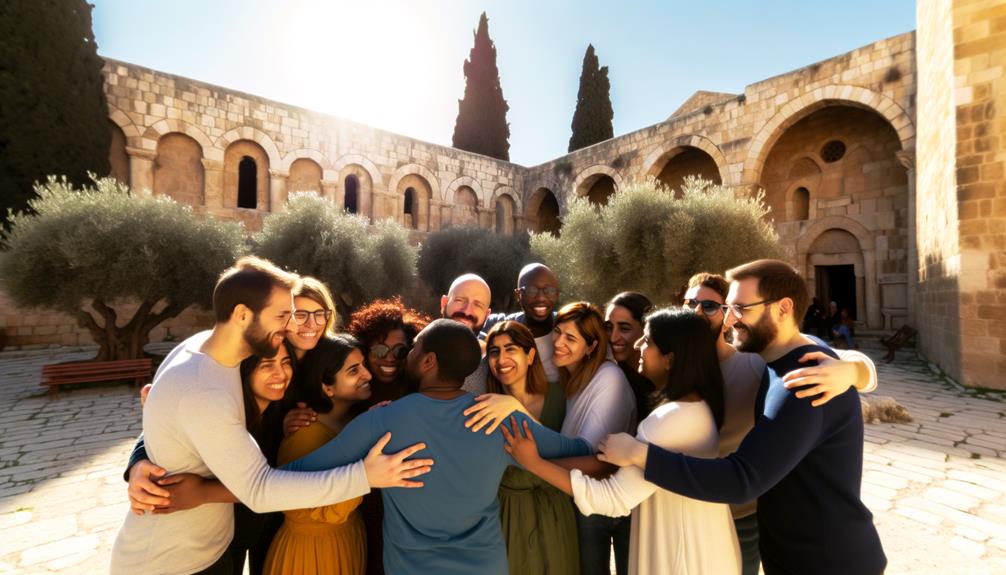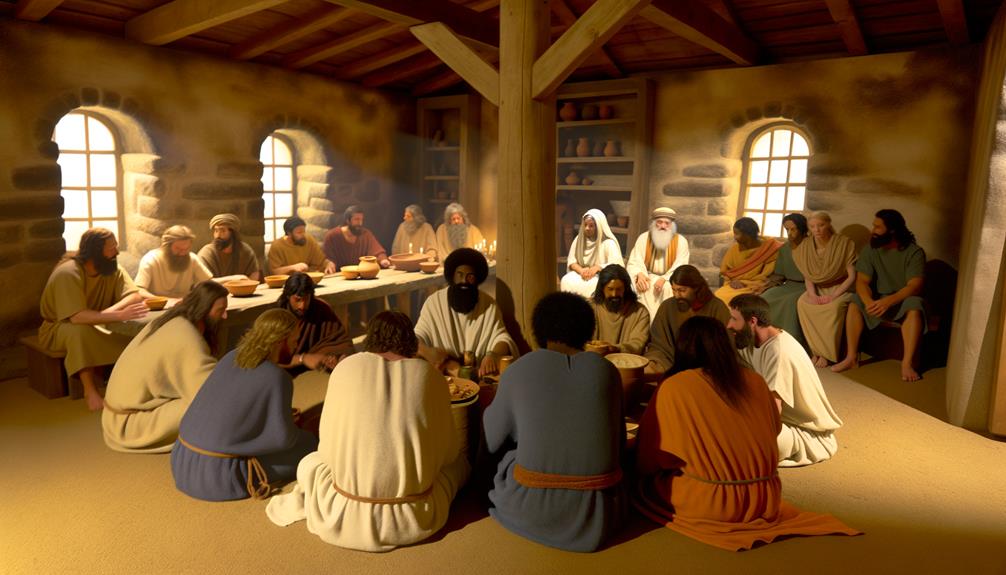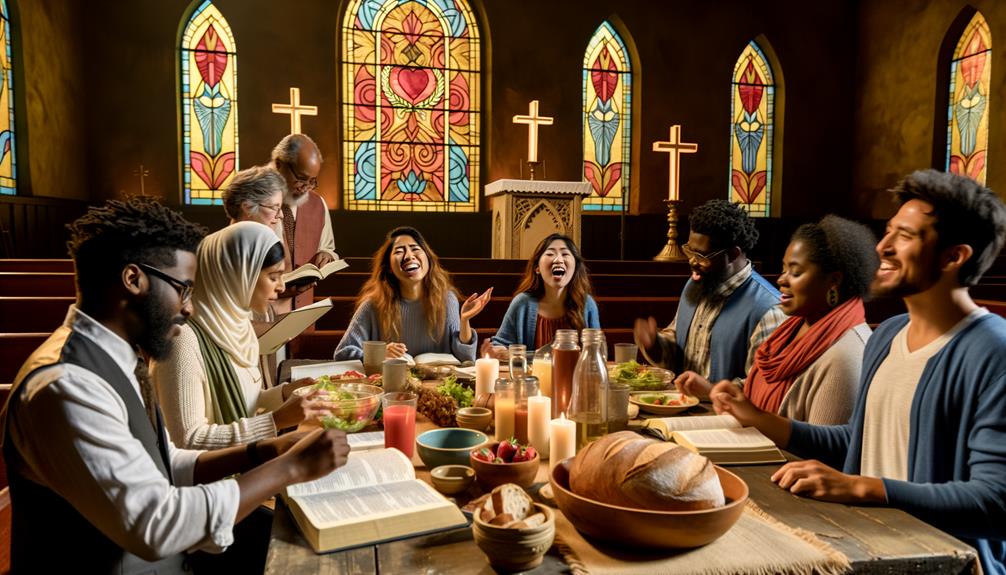Fellowship In The Bible Meaning: Unity and Community
Fellowship in the Bible, derived from the Greek term ‘koinonia,’ signifies a deep spiritual communion among believers anchored in shared faith and communal living. This concept is foundational in both Old and New Scriptures, with early Christian communities exemplifying profound unity and mutual support through practices like breaking bread and collective worship (Acts 2:42-47).
‘Koinonia’ encompasses not only fellowship but shared participation and spiritual harmony, fostering a united life in Christ through the Holy Spirit. Modern churches continue this tradition, ensuring fellowship remains integral to spiritual growth and communal resilience.
Explore further to understand its enduring significance throughout biblical history.

Fellowship in the Bible Meaning: Spiritual Unity and Community in Christ
| Aspect | Biblical Insight |
|---|---|
| Definition | Deep spiritual connection and partnership among believers |
| Greek Word | Koinonia – communion, sharing, participation |
| Key Scripture | Acts 2:42 – They devoted themselves to fellowship, breaking of bread, and prayer |
| Spiritual Significance | Unity in Christ, mutual support, and shared purpose |
| Purpose | Encourages growth, accountability, and love within the body of Christ |
| Application | Involves worship, service, prayer, and living life together in faith |
Definition of Fellowship

In the context of Christian theology, the term ‘fellowship’ refers to a communal bond among believers that is deeply rooted in shared faith, mutual support, and collective participation in the life and mission of the Church.
This concept, derived from the Greek word ‘koinonia,’ encapsulates the essence of living in spiritual harmony and unity.
Historically, fellowship has been integral to the Christian experience, fostering a sense of belonging and purpose.
Scriptural analysis reveals its significance through passages such as Acts 2:42, which highlights the early church’s devotion to apostolic teaching, communal living, and prayer.
Fellowship is therefore not merely social interaction but a profound spiritual connection that strengthens the body of Christ and advances its divine mission.
Fellowship in the Old Testament

The Old Scripture reveals the foundations of fellowship through the covenantal relationships established between God and His people, emphasizing communal worship, shared responsibilities, and mutual care.
In the Old Scripture, fellowship is vividly portrayed through the communal life of Israel, where the covenant at Sinai united the people in worship and obedience to Yahweh. The Tabernacle and later the Temple served as focal points for collective worship, signifying collective identity and divine presence.
| Covenant Aspect | Emotional Impact |
|---|---|
| Communal Worship | Spiritual Unity |
| Shared Responsibilities | Collective Strength |
| Mutual Care | Deepened Trust |
| Tabernacle Gatherings | Sacred Fellowship |
| Temple Worship | Divine Presence |
This scriptural portrayal underscores the interwoven nature of individual and communal faithfulness in the Old Scripture narrative.
Fellowship in the New Testament

The New Covenant underscores the concept of fellowship through the lens of the early church community, emphasizing the unity and mutual support among believers.
Acts 2:42-47 illustrates how shared spiritual practices such as prayer, breaking of bread, and communal living were integral to fostering a sense of belonging and spiritual growth.
This theological framework not only solidified the nascent Christian identity but also provided a model for subsequent generations of believers.
Early Church Community
Early Christian communities exemplified a profound sense of fellowship, rooted deeply in the teachings and practices of the New Scriptures. The Book of Acts and Pauline Epistles offer vivid depictions of this communal life, highlighting shared resources, mutual support, and collective worship.
Acts 2:42-47 illustrates the believers’ devotion to apostles’ teaching, breaking of bread, and prayers, establishing a model of koinonia. This fellowship was not merely social but profoundly spiritual, reflecting Christ’s teachings of love and unity. The early church’s communal living provided a tangible expression of theological principles, reinforcing the unity of the Body of Christ.
| Element | Scriptural Reference |
|---|---|
| Apostles’ Teaching | Acts 2:42 |
| Breaking of Bread | Acts 2:46 |
| Prayer | Acts 2:42 |
| Shared Resources | Acts 2:44-45 |
| Mutual Support | Galatians 6:2 |
Shared Spiritual Practices
Shared spiritual practices in the New Scriptures reflect a cohesive and theologically rich framework that underscores the essence of Christian fellowship.
The Acts of the Apostles delineate the communal life of early believers, emphasizing prayer, breaking of bread, and apostolic teaching (Acts 2:42). These activities fostered unity and spiritual growth, illustrating that fellowship is not merely social but profoundly participatory in divine life.
Pauline epistles further elucidate this by advocating for communal worship, mutual edification, and the exercise of spiritual gifts (1 Corinthians 12). Consequently, shared practices were instrumental in creating a spiritually vibrant community, grounded in Christ.
This historical context and scriptural analysis reveal how these practices functioned as the bedrock of early Christian fellowship.
Koinonia: The Greek Concept

The Greek term ‘koinonia‘ encompasses a profound sense of fellowship, communion, and shared participation, often manifesting in mutual support and communal living among early Christians.
Scriptural references, such as Acts 2:42 and 1 Corinthians 10:16, illustrate how this concept was integral to the spiritual and social fabric of the early Church.
Meaning of Koinonia
Derived from the Greek word ‘koinonia,’ the concept of fellowship in the Bible encompasses a profound sense of spiritual communion and mutual participation among believers.
Rooted in early Christian communities, koinonia signifies more than mere association; it conveys a shared life in Christ, united through the Holy Spirit.
Theologically, koinonia reflects the essence of the Trinitarian relationship, where mutual indwelling and love are central.
Scripturally, it extends beyond social interaction to include shared worship, sacramental life, and collective mission (Acts 2:42-47).
Historically, this fellowship was foundational to the Church’s identity, fostering a bonded, interdependent community.
Consequently, koinonia embodies a holistic, spiritually rich participation in the Christian faith, reflecting both divine and communal dimensions.
Biblical Examples of Koinonia
Acts 2:42-47 vividly illustrates the essence of koinonia, where early Christians devoted themselves to the apostles’ teaching, fellowship, breaking of bread, and prayers, thereby embodying a communal life deeply rooted in spiritual and material solidarity.
This passage underscores a model of communal reciprocity that transcends mere social interaction, reflecting a theological commitment to shared life.
The believers’ practices included pooling resources, ensuring no one was in need, and collectively praising God, which emphasizes both vertical (God-human) and horizontal (human-human) dimensions of fellowship.
This holistic approach to koinonia integrates doctrinal faithfulness with tangible expressions of care, portraying the early church as a living embodiment of God’s kingdom on earth, defined by mutual support and unified worship.
Fellowship in Early Christianity

In early Christianity, fellowship, often termed ‘koinonia‘ in Greek, was foundational to the communal and spiritual life of believers, fostering a profound sense of unity and shared purpose.
Rooted in Acts 2:42, where the early church devoted themselves to the apostles’ teaching, the breaking of bread, and prayers, koinonia encompassed spiritual communion and practical support.
This fellowship was not merely social but deeply theological, reflecting the Trinitarian nature of God—Father, Son, and Holy Spirit.
The Epistles, especially Paul’s letters, further illustrate this, emphasizing mutual participation in Christ (1 Corinthians 10:16) and sharing in sufferings and joys (Philippians 1:5).
Consequently, koinonia in early Christianity was a divine mandate shaping the church’s identity and mission.
Unity and Mutual Support

Building upon the theological foundation of koinonia, unity and mutual support were indispensable elements in the life of the early Christian community, manifesting through shared resources and collective care as depicted in passages like Acts 4:32-35.
The communal sharing underscored the abandonment of individualistic pursuits for the sake of collective welfare, reflecting the teachings of Christ.
| Aspect | Scriptural Basis |
|---|---|
| Shared Resources | Acts 4:32-35 |
| Collective Care | Galatians 6:2 |
| Spiritual Unity | Ephesians 4:3 |
| Practical Support | Romans 12:13 |
The early church valued practical expressions of fellowship, ensuring no member was in need. This unity fostered a tangible sense of belonging, fortifying the communal faith and exemplifying Christ’s love.
Spiritual Growth Through Fellowship

The transformative power of fellowship in the early Christian church catalyzed spiritual growth, as believers engaged in communal worship, prayer, and the study of Scripture, fostering deeper faith and discipleship.
Acts 2:42 highlights the apostles’ commitment to teaching, the breaking of bread, and prayers, which epitomized this collective pursuit of spiritual maturity.
Historically, such gatherings provided a structured environment where theological understanding deepened, and spiritual gifts were nurtured.
Theologically, fellowship served as an essential avenue for mutual edification, as outlined in Hebrews 10:24-25, encouraging believers to spur one another toward love and good deeds.
This synergy of shared spiritual experiences and doctrinal reinforcement strengthened individual faith, promoting a robust and resilient Christian community.
Fellowship in Worship

Fellowship in worship is profoundly rooted in the unity exemplified by collective praise, as seen in Acts 2:42-47 where early Christians gathered to break bread and pray together.
This unity fosters shared spiritual experiences that are instrumental in the communal strengthening of faith, reminiscent of the psalmist’s exhortation in Psalm 95:1-2 to sing and rejoice before the Lord.
Historically, such practices have not only reinforced individual belief but also nurtured a resilient and cohesive community of believers.
Unity Through Collective Praise
In the context of biblical theology, collective praise serves as a profound expression of unity among believers, reflecting the communal nature of worship as depicted in both the Old Scriptures and New Scriptures.
In the Old Covenant, the Israelites often gathered for communal worship, as seen in Psalms 95:1, which calls for collective singing and thanksgiving.
The New Covenant continues this tradition, emphasizing the importance of unity in worship as exemplified in Acts 2:42-47, where early Christians devoted themselves to communal prayer and praise.
This unity through collective praise is not merely a ritualistic act but a theological affirmation of the Body of Christ, fostering a shared identity and purpose among believers, thereby strengthening the spiritual bonds within the community.
Shared Spiritual Experiences
How do shared spiritual experiences in worship contribute to the theological understanding of fellowship within the Christian community?
Historically, communal worship has been integral to the Christian tradition, as seen in Acts 2:42, where believers ‘devoted themselves to the apostles’ teaching and fellowship, to the breaking of bread and the prayers.’
Theologically, these shared experiences embody the unity of the Body of Christ, fostering a sense of belonging and mutual edification.
Scripturally, Matthew 18:20 underscores this, stating, ‘For where two or three gather in my name, there am I with them.’
This collective gathering not only strengthens communal bonds but also deepens individual faith, as believers experience God’s presence in unison, epitomizing true Christian fellowship.
Strengthening Faith Together
Building on the foundation of shared spiritual experiences, the act of worship within the Christian community serves as a profound means of strengthening individual and collective faith.
Historically, early Christians gathered in homes (Acts 2:46) and synagogues (Acts 14:1) to worship, fostering unity and spiritual growth.
Scripturally, Hebrews 10:25 exhorts believers to ‘not give up meeting together,’ emphasizing the importance of communal worship.
Engaging in practices such as prayer, singing hymns, and reading Scripture, believers draw nearer to God and each other.
This shared act of devotion creates a spiritual synergy, reinforcing doctrinal beliefs and providing mutual encouragement.
Consequently, fellowship in worship becomes an essential instrument in nurturing and invigorating faith within the body of Christ.
Accountability Among Believers

A cornerstone of biblical fellowship, accountability among believers serves as a vital mechanism for spiritual growth and communal integrity.
Historically, the early Christian communities exemplified this principle, as seen in Acts 2:42-47, where believers devoted themselves to the apostles’ teaching, fellowship, breaking of bread, and prayer. This mutual accountability fostered a transformative environment, encouraging adherence to moral and ethical standards.
Scripture underscores this with passages like Galatians 6:1-2, which admonishes believers to restore one another gently and to bear each other’s burdens.
Such accountability not only reinforces individual faith but also fortifies the collective body of Christ, ensuring that each member remains aligned with divine teachings and communal objectives, thereby enhancing spiritual resilience and unity.
Fellowship in Modern Churches

In contemporary churches, fellowship continues to serve as an essential foundation for spiritual growth and communal cohesion, reflecting the early Christian practice of koinonia. This Greek term, found in Acts 2:42, encapsulates the sharing of life among believers.
Modern congregations emphasize fellowship through small groups, communal worship, and acts of service, mirroring the collective unity depicted in the New Covenant. Historically, the Church has evolved in its methods of fostering fellowship, yet the scriptural mandate remains unchanged.
Hebrews 10:24-25 urges believers to encourage one another and assemble together, highlighting the importance of mutual edification. Consequently, fellowship in today’s churches not only honors biblical tradition but also addresses contemporary spiritual needs, reinforcing the timeless value of community in faith.
The Enduring Relevance of Fellowship

While modern churches adapt their methods to nurture community, the enduring relevance of fellowship remains rooted in the biblical principles and practices established by the early Christian communities.
Acts 2:42 highlights the steadfast devotion to the apostles’ teaching, communal life, breaking of bread, and prayer. These foundational practices created a cohesive, spiritually enriched community.
Historically, the Greek term ‘koinonia’ captures the essence of fellowship, emphasizing shared participation and mutual support.
Scripturally, 1 John 1:7 underscores that walking in the light fosters genuine fellowship among believers, strengthened by Christ’s redemptive work.
Consequently, fellowship transcends cultural shifts, maintaining its core as a divine mandate for unity, spiritual growth, and collective witness in the body of Christ.
Conclusion
Fellowship, an essential cornerstone of biblical tradition, transcends mere social interaction, embodying divine communion and spiritual unity.
From the communal practices of the Old Covenant to the profound koinonia of the New Covenant, fellowship manifests as a critical element of worship and accountability, shaping early Christian communities and modern churches alike.
The enduring relevance of fellowship underscores its unparalleled importance, echoing through centuries as the lifeblood sustaining the collective faith and spiritual energy of believers.






